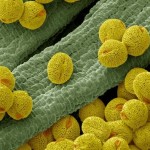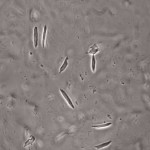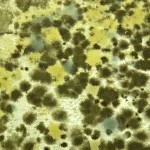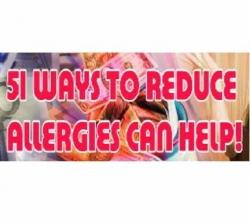Ah, spring is in the air! Crisp cold air turns to cool breezes, flowers bloom, butterflies take flight…and your allergies EXPLODE. Runny noses, itchy eyes, congestion galore. Yes, as beautiful as spring can be–it can also be a thorn in an allergy sufferer’s side. Sure, there’s an assortment of allergy medicine you can take, but for those that prefer more natural methods–or just want to ease the inevitable–here are ten tips for alleviating those pesky allergies this spring (and year-round).
First, Let Us Identify the Assailants:
 Pollen
Pollen
Pollen, that dust like reproductive part of a plant, and is a common cause of allergic reactions. Since pollen is easily inhaled, it’s best to avoid early ventures into the great outdoors, specifically between the hours of 5-10a when the pollen count is the highest. The safest hour? Late afternoon and right after a rainstorm.
 Dust Mites
Dust Mites
Dust mites are the second biggest cause of allergies. Dust mites shed their skin when they grow and this is what causes allergic reactions. To avoid dust mites where you sleep at night: Wash bedding at least once a week; Replace old mattresses (An old mattress can contain between 1 and 10 million dust mites. Pretty disgusting, eh?); And use dust mite powder on carpets, upholstery, and bedding.
 Pet Dander
Pet Dander
Pet dander is the loose flakes of skin that animals shed, so as much as we love our furry cuddle buddies–it’s best to not have them share your sleeping space. This can cut your dander allergies in half. It’s also important to bathe them often/ have them groomed. If you suffer severely from pet dander but desperately want a fur pal–dog breeds like poodles, terriers, schnauzers, and hairless are allergy-friendly (not hypoallergenic as some claim). For you cat lovers, the Sphynx, a type of hairless cat, produces fewer allergens.
 Mold
Mold
Like pollen, mold is also easily airborne and found almost anywhere from food to your the bathroom ceiling. It’s a major contributor to seasonal allergies and health problems. Respiratory problems, wheezing, coughing, throat irritation, sneezing fits, and trouble breathing are all signs that you have been exposed to mold. To help prevent this potential danger to your health: Minimize indoor plants or clean the leaves daily; Thoroughly clean shower curtains, damp basements and air conditioners, and drain pans; And don’t hang clothes or bedding out to dry; use a dryer
Get Your Free E-Book!

Do you hate the spring?
Do you run at the site of a dog or cat?
Do you carry around tissues wherever you go?
You’re not alone.
51 Ways to Reduce Allergies can help!
![]() We value your privacy and would never spam you
We value your privacy and would never spam you
Now that we’ve clearly revealed your adversaries…here’s ten tips on combating them.
Ten Tips For Alleviating Allergies
- Remember to dust. Choose a broom that doesn’t recirculate dust and minimize shelving. 50% of dust collects on shelves, including those collectable cherubs and other knick-knacks you keep on them, so if you can not minimize shelving or simply do not want to–try to keep the dust-magnet odds and ends inside a cabinet (perhaps behind a glass door or window so you can show them off).
- Supplements. Certain supplements can alleviate allergies such as B-Complex (maintains nervous system), Vitamin C (keeps your immune system strong), Calcium (not only does it strengthen bones but calcium creates an antihistaminic action), Anti-Oxidant Combination ( zinc and selenium, vitamins A, C, E, and beta-carotene strengthen allergy resistance).
- Shower before bed. You may collect mites, pollen, and mold in your hair during the day.
- Clean floors 2x a week (with a vacuum and a clean mop).
- Keep your windows closed. We know that’s tough when it’s beautiful outside but if you suffer severely, it’s best to close the window so allergens don’t get in. This goes for the car as well. Use the AC when possible during the summer.
- Drink water. Drinking a gallon of water a day flushes out toxins and hydrates you (yes, we know a gallon is a LOT. Do the best you can).
- HEPA filter. HEPA, or High Efficiency Particulate Arrestors, traps tiny particles and greatly reduces allergens.
- Face masks. Wear a face mask while mowing, cleaning, vacuuming, changing bedding and grooming pets to prevent from breathing in allergens.
- Avoid smoke. Smoking weakens your immune system. Mold can grow where smokers congregate.
- Use filters. Vent filters can trap airborne particles like dirt, lint, dust mites and hair. Place them over heating and cooling vents to help alleviate allergies.










